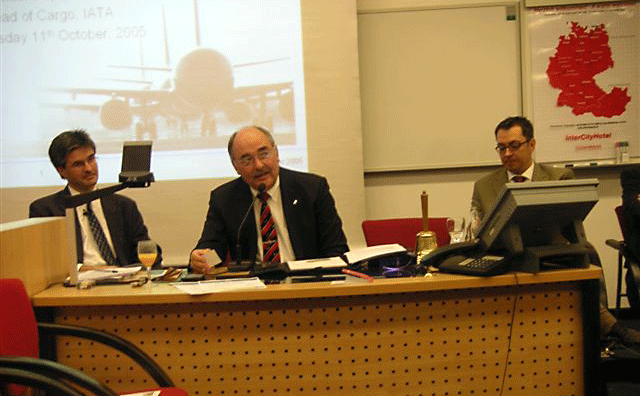IATA
Pitches Paperless Cargo
 Pictured
at ACD meeting October 11 (left to right) IATA Cargo's Aleks Popovich,
ACD chairman Wolfgang Korte and deputy Mathias Jakobi. Pictured
at ACD meeting October 11 (left to right) IATA Cargo's Aleks Popovich,
ACD chairman Wolfgang Korte and deputy Mathias Jakobi. |
The rationale could not be simpler: “to
finally reduce the transit time of general airfreight shipments from six
and a half days – while getting rid of as many of the 38 documents
issued on the way, as soon as possible.”
“Ah, the best laid plans of mice and
men,” we quietly recall industry comment and reaction, as one paperless
initiative after another sailed down the tubes during our years covering
air cargo.
But this time will be different?
Heralding itself, “The Most Important Cargo
Event of the Year”, the IATA e-freight conference, a two day confab
is being held in Geneva Switzerland November 1 and 2.
People who have shouldered this industry
have heard about paperwork streamlining before.
Depending on how far back you go, air cargo
has talked about going paperless since the 1960 era, even as the first
monstrous vacuum tube computers sat blinking and popping in specially
isolated rooms with reinforced floors.
 But
this past Tuesday October 11, 2005 at the Aircargo Club Germany monthly
meeting at The Steigenberger Hotel located in Cargo City South at Frankfurt
International Airport with more than 80 industry executives in attendance
is assured by an earnest and obviously smart Aleks Popovich, newly assigned
Global Head of Cargo of IATA – International Air Transport Association,
that this time things will be different. But
this past Tuesday October 11, 2005 at the Aircargo Club Germany monthly
meeting at The Steigenberger Hotel located in Cargo City South at Frankfurt
International Airport with more than 80 industry executives in attendance
is assured by an earnest and obviously smart Aleks Popovich, newly assigned
Global Head of Cargo of IATA – International Air Transport Association,
that this time things will be different.
And so after a couple of hours and a couple
of beers, surrounded by the dear hearts and gentle people who comprise
the great ACD we are thinking:
If IATA’s e-freight initiative is
not the answer, it will have to do, until the real thing comes along.
Point of fact, the IATA approach seems to
be different and quite promising.
Promising for a number of sustainable basic
reasons.
Electronic or e-ticketing has worked in
the passenger business.
But also in the post 9/11 world, IATA cargo
has finally come off it, scrapping an edict for air cargo, with a conversant
approach for a paperless solution.
IATA e-freight will be realized in staged
implementation with plenty of opportunity for feedback that is aimed solely
for the benefit of all, along the logistics chain of international air
cargo.
One smart event at the local Frankfurt air
cargo club this week.
Mr. Popovich reiterates that air cargo liberalization
has reduced the importance of the carrier-agent compact and thus the strong
hand that IATA once enjoyed in this relationship.
Here, Aleks seems to present a kinder-gentler
IATA, more down to earth, and seemingly willing to be engaged in the more
practical day-to-day matters of the cargo business.
As the IATA power point presentation flicks
forward, Mr. Popovich admits that there has been a lot of conversation
through the years, with little delivery.
Gadzooks we think, maybe this guy will turn
out to be “Alexander, Great for air cargo”?
He points out how air cargo is a complex
industry and that any effort to achieve real improvement should be top-down
and in all segments of the chain.
Equally important are the two goals –
a faster throughput of cargo and data, as well as considerable savings
in the total process from shipper to consignee.
The motto to aim at all levels should therefore
be minimum administration – maximum output.
Aleks has people sit up and pay attention
when he suggests that complete streamlining of links in the chain and
an electronic paperless processing environment could save up to 80 percent
of today’s handling and processing activities or US$ 1.2 billion
for the entire industry.
The speaker does not shrink as he mentions
another IATA initiative, “Cargo 2000” which was dominated
by the airlines at the beginning, but has now expanded to include freight
forwarders, integrators and handling companies.
Cargo 2000 has finally dumped its egocentric
approach, allowing more people in as members but also this year is not
only measuring quality performance, but publishing the results.
But to the meat of the meeting.
Mr. IATA Cargo invites all concerned to
cooperate closely with each other to achieve “e-freight,”
the sooner the better.
Aleks Popovich notes that the IATA approach
to ”e-freight” is inclusive amongst shippers, agents, airlines,
airports, as well as customs brokers, truckers, handling companies and
others.
As he speaks, it is obvious to all that
the e-freight initiative will be perhaps the greatest challenge for the
air cargo industry.
For example, part of the equation for achieving
“e-freight” involves bringing on board, governing world bodies
such as the United Nations and World Trade Organization.
Legal aspects must also be addressed.
Implementation of an electronic document
will always have to take into question – which country has agreed
to and signed what?
But rather than dwell on what if, most at
ACD went away thinking, why not?
IATA is the ideal if not only institution
that has the juice to carry the e-freight project to all corners of worldwide
politics and global trade.
(Guenter Mosler)
|



